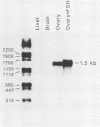Abstract
Inhibin, a gonadal protein that preferentially suppresses the secretion of pituitary follicle-stimulating hormone, has been isolated from porcine follicular fluid and characterized as a 32-kDa protein composed of 18-kDa and 14-kDa subunits. In the present work, oligonucleotide probes predicted from amino-terminal inhibin amino acid sequences have been used to isolate, from a porcine ovarian lambda gt11 cDNA library, clones encoding the 18-kDa subunit, or A chain, of inhibin. DNA sequence analysis showed that the inhibin A chain is initially synthesized as a larger precursor protein and is predicted to be a glycopeptide. Inhibin A-chain mRNA is present specifically in the gonads, and its synthesis can be induced by treatment of the animal with gonadotropins. The porcine probe was used to isolate a human inhibin A-subunit cDNA from a placental cDNA library. The human precursor is highly homologous to its porcine counterpart and is predicted to generate an 18-kDa glycosylated inhibin A subunit.
Full text
PDF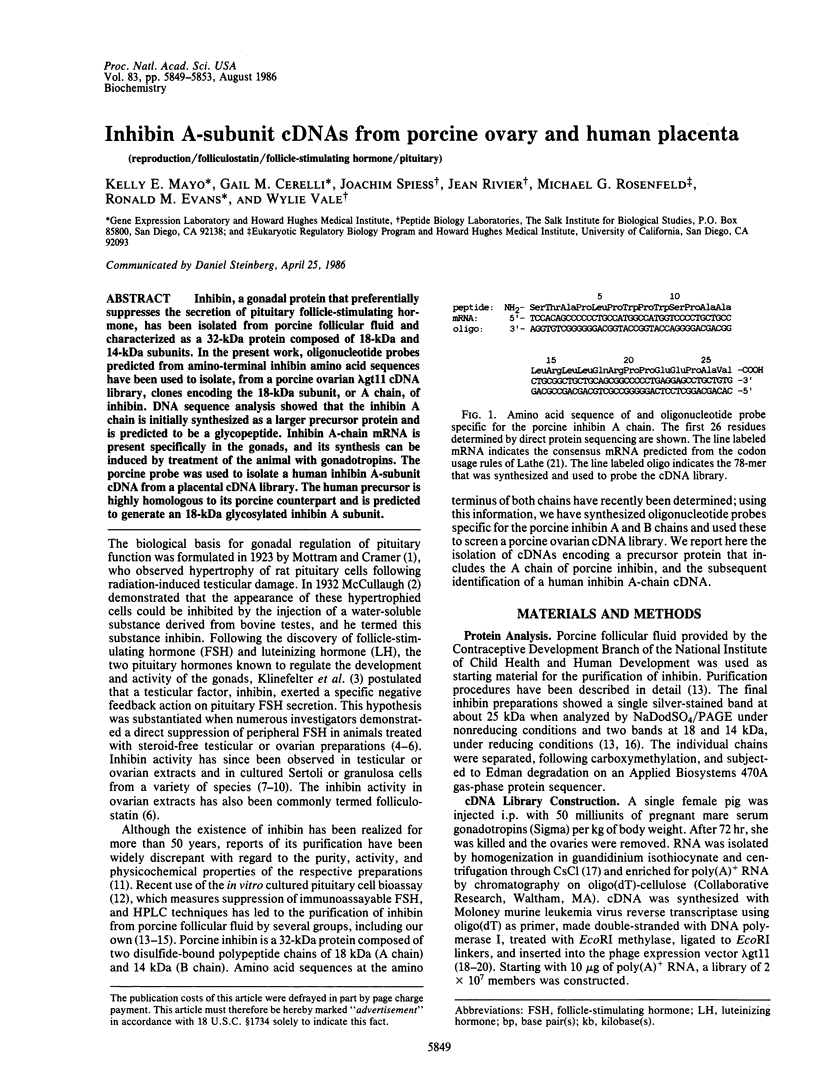
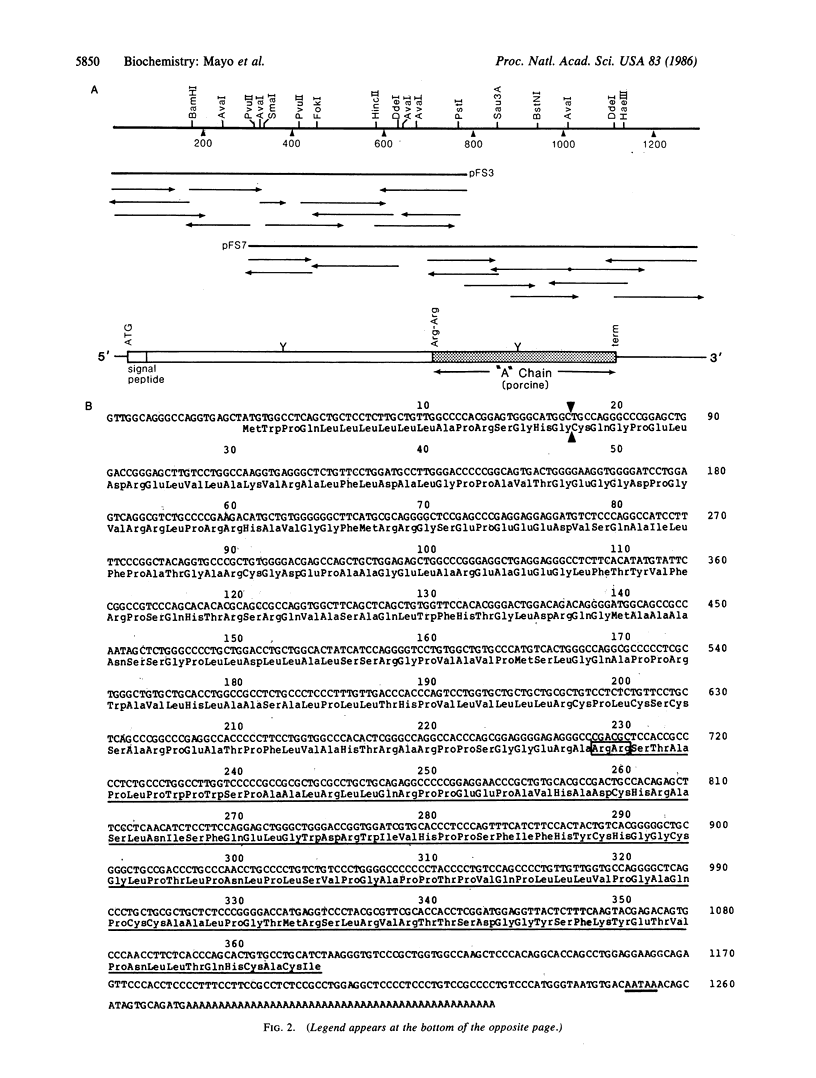
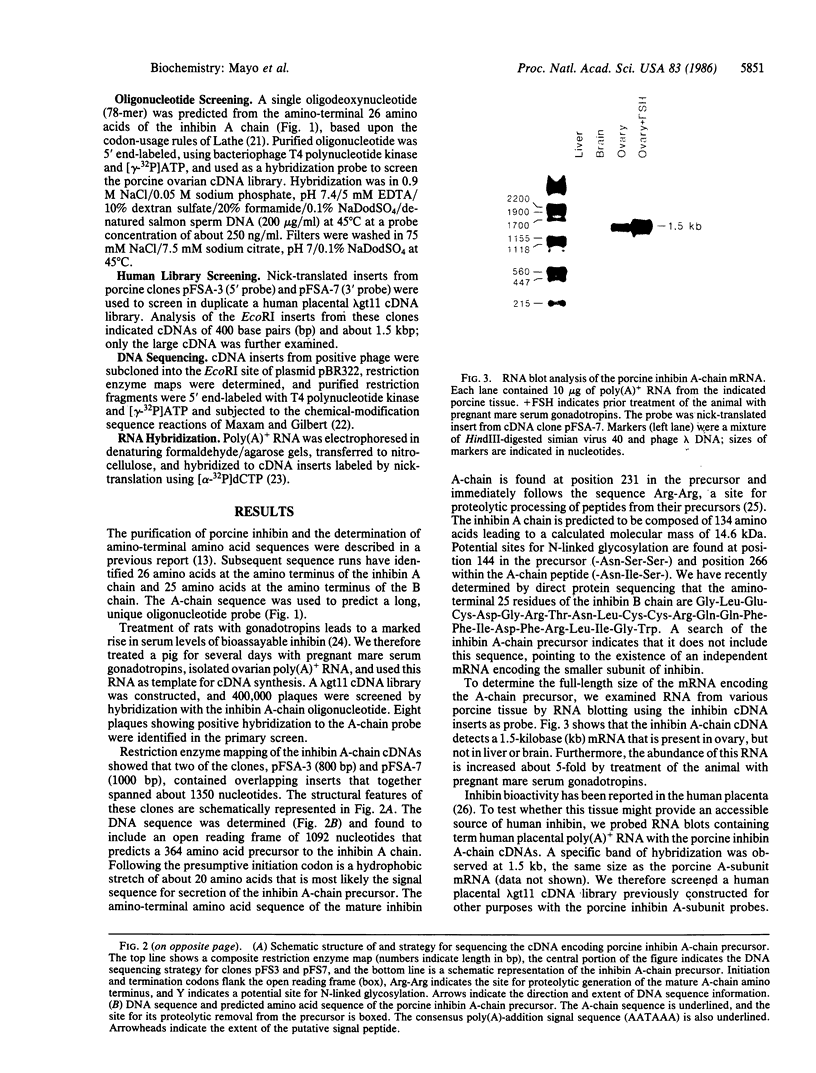
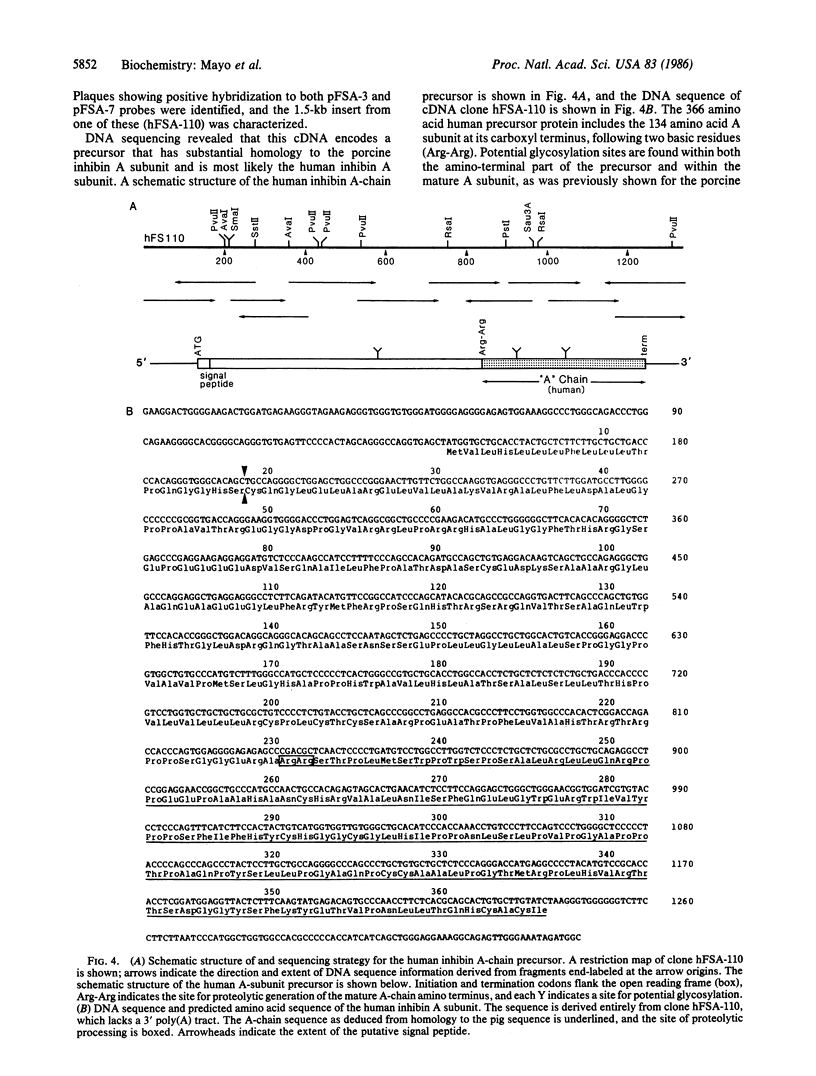
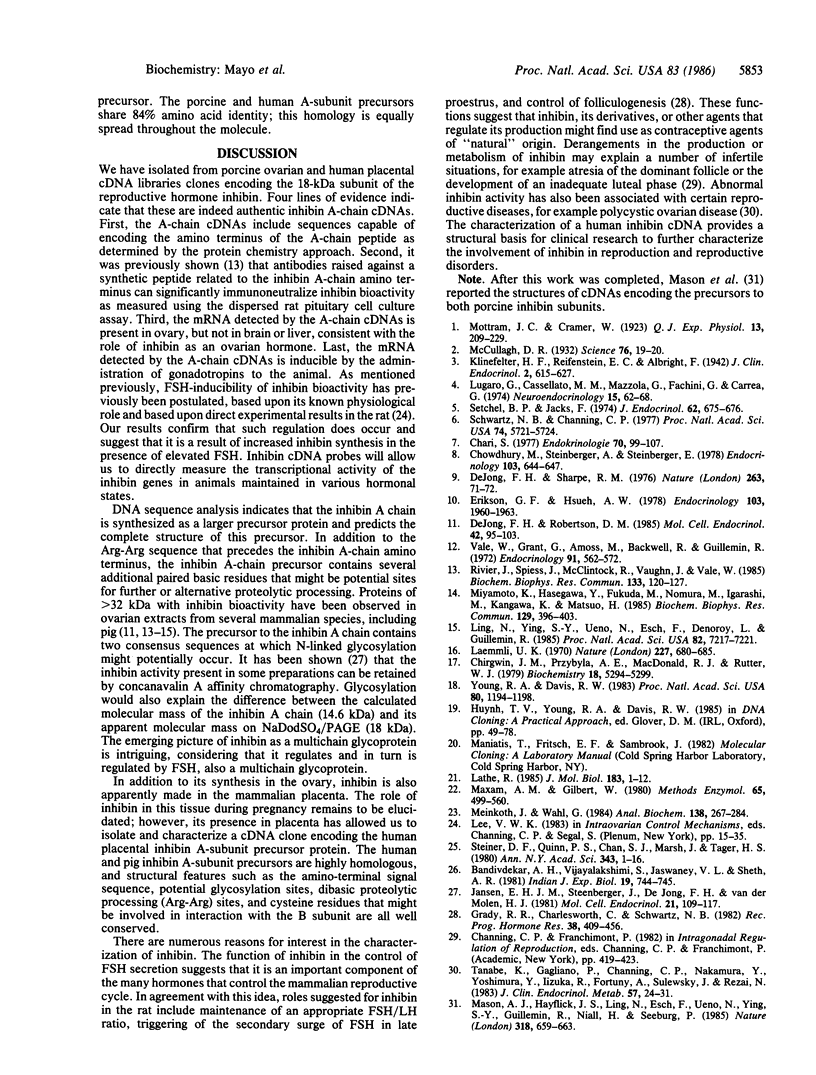
Images in this article
Selected References
These references are in PubMed. This may not be the complete list of references from this article.
- Bandivdekar A. H., Vijayalakshmi S., Jaswaney V. L., Sheth A. R. Inhibin in human placenta. Indian J Exp Biol. 1981 Aug;19(8):744–745. [PubMed] [Google Scholar]
- Chari S. Chemistry and physiology of inhibin--a review. Endokrinologie. 1977 Sep;70(1):99–107. [PubMed] [Google Scholar]
- Chirgwin J. M., Przybyla A. E., MacDonald R. J., Rutter W. J. Isolation of biologically active ribonucleic acid from sources enriched in ribonuclease. Biochemistry. 1979 Nov 27;18(24):5294–5299. doi: 10.1021/bi00591a005. [DOI] [PubMed] [Google Scholar]
- Chowdhury M., Steinberger A., Steinberger E. Inhibition of de novo synthesis of FSH by the Sertoli cell factor (SCF). Endocrinology. 1978 Aug;103(2):644–647. doi: 10.1210/endo-103-2-644. [DOI] [PubMed] [Google Scholar]
- De Jong F. H., Sharpe R. M. Evidence for inhibin-like activity in bovine follicular fluid. Nature. 1976 Sep 2;263(5572):71–72. doi: 10.1038/263071a0. [DOI] [PubMed] [Google Scholar]
- Erickson G. F., Hsueh A. J. Secretion of "inhibin" by rat granulosa cells in vitro. Endocrinology. 1978 Nov;103(5):1960–1963. doi: 10.1210/endo-103-5-1960. [DOI] [PubMed] [Google Scholar]
- Grady R. R., Charlesworth M. C., Schwartz N. B. Characterization of the FSH-suppressing activity in follicular fluid. Recent Prog Horm Res. 1982;38:409–456. doi: 10.1016/b978-0-12-571138-8.50015-9. [DOI] [PubMed] [Google Scholar]
- Jansen E. H., Steenbergen J., de Jong F. H., van der Molen H. J. The use of affinity matrices in the purification of inhibin from bovine follicular fluid. Mol Cell Endocrinol. 1981 Feb;21(2):109–117. doi: 10.1016/0303-7207(81)90048-4. [DOI] [PubMed] [Google Scholar]
- Laemmli U. K. Cleavage of structural proteins during the assembly of the head of bacteriophage T4. Nature. 1970 Aug 15;227(5259):680–685. doi: 10.1038/227680a0. [DOI] [PubMed] [Google Scholar]
- Lathe R. Synthetic oligonucleotide probes deduced from amino acid sequence data. Theoretical and practical considerations. J Mol Biol. 1985 May 5;183(1):1–12. doi: 10.1016/0022-2836(85)90276-1. [DOI] [PubMed] [Google Scholar]
- Ling N., Ying S. Y., Ueno N., Esch F., Denoroy L., Guillemin R. Isolation and partial characterization of a Mr 32,000 protein with inhibin activity from porcine follicular fluid. Proc Natl Acad Sci U S A. 1985 Nov;82(21):7217–7221. doi: 10.1073/pnas.82.21.7217. [DOI] [PMC free article] [PubMed] [Google Scholar]
- Lugaro G., Casellato M. M., Mazzola G., Fachini G., Carrea G. Evidence for the existence in spermatozoa of a factor inhibiting the follicle stimulating hormone releasing hormone synthesis. Neuroendocrinology. 1974;15(1):62–68. doi: 10.1159/000122293. [DOI] [PubMed] [Google Scholar]
- Mason A. J., Hayflick J. S., Ling N., Esch F., Ueno N., Ying S. Y., Guillemin R., Niall H., Seeburg P. H. Complementary DNA sequences of ovarian follicular fluid inhibin show precursor structure and homology with transforming growth factor-beta. Nature. 1985 Dec 19;318(6047):659–663. doi: 10.1038/318659a0. [DOI] [PubMed] [Google Scholar]
- Maxam A. M., Gilbert W. Sequencing end-labeled DNA with base-specific chemical cleavages. Methods Enzymol. 1980;65(1):499–560. doi: 10.1016/s0076-6879(80)65059-9. [DOI] [PubMed] [Google Scholar]
- McCullagh D. R. DUAL ENDOCRINE ACTIVITY OF THE TESTES. Science. 1932 Jul 1;76(1957):19–20. doi: 10.1126/science.76.1957.19. [DOI] [PubMed] [Google Scholar]
- Meinkoth J., Wahl G. Hybridization of nucleic acids immobilized on solid supports. Anal Biochem. 1984 May 1;138(2):267–284. doi: 10.1016/0003-2697(84)90808-x. [DOI] [PubMed] [Google Scholar]
- Miyamoto K., Hasegawa Y., Fukuda M., Nomura M., Igarashi M., Kangawa K., Matsuo H. Isolation of porcine follicular fluid inhibin of 32K daltons. Biochem Biophys Res Commun. 1985 Jun 14;129(2):396–403. doi: 10.1016/0006-291x(85)90164-0. [DOI] [PubMed] [Google Scholar]
- Rivier J., Spiess J., McClintock R., Vaughan J., Vale W. Purification and partial characterization of inhibin from porcine follicular fluid. Biochem Biophys Res Commun. 1985 Nov 27;133(1):120–127. doi: 10.1016/0006-291x(85)91849-2. [DOI] [PubMed] [Google Scholar]
- Schwartz N. B., Channing C. P. Evidence for ovarian "inhibin": suppression of the secondary rise in serum follicle stimulating hormone levels in proestrous rats by injection of porcine follicular fluid. Proc Natl Acad Sci U S A. 1977 Dec;74(12):5721–5724. doi: 10.1073/pnas.74.12.5721. [DOI] [PMC free article] [PubMed] [Google Scholar]
- Setchell B. P., Jacks F. Inhibin-like activity in rete testis fluid. J Endocrinol. 1974 Sep;62(3):675–676. doi: 10.1677/joe.0.0620675. [DOI] [PubMed] [Google Scholar]
- Steiner D. F., Quinn P. S., Chan S. J., Marsh J., Tager H. S. Processing mechanisms in the biosynthesis of proteins. Ann N Y Acad Sci. 1980;343:1–16. doi: 10.1111/j.1749-6632.1980.tb47238.x. [DOI] [PubMed] [Google Scholar]
- Tanabe K., Gagliano P., Channing C. P., Nakamura Y., Yoshimura Y., Iizuka R., Fortuny A., Sulewski J., Rezai N. Levels of inhibin-F activity and steroids in human follicular fluid from normal women and women with polycystic ovarian disease. J Clin Endocrinol Metab. 1983 Jul;57(1):24–31. doi: 10.1210/jcem-57-1-24. [DOI] [PubMed] [Google Scholar]
- Vale W., Grant G., Amoss M., Blackwell R., Guillemin R. Culture of enzymatically dispersed pituitary cells: functional validation of a method. Endocrinology. 1972 Aug;91(2):562–572. doi: 10.1210/endo-91-2-562. [DOI] [PubMed] [Google Scholar]
- Young R. A., Davis R. W. Efficient isolation of genes by using antibody probes. Proc Natl Acad Sci U S A. 1983 Mar;80(5):1194–1198. doi: 10.1073/pnas.80.5.1194. [DOI] [PMC free article] [PubMed] [Google Scholar]
- de Jong F. H., Robertson D. M. Inhibin: 1985 update on action and purification. Mol Cell Endocrinol. 1985 Sep;42(2):95–103. doi: 10.1016/0303-7207(85)90096-6. [DOI] [PubMed] [Google Scholar]



